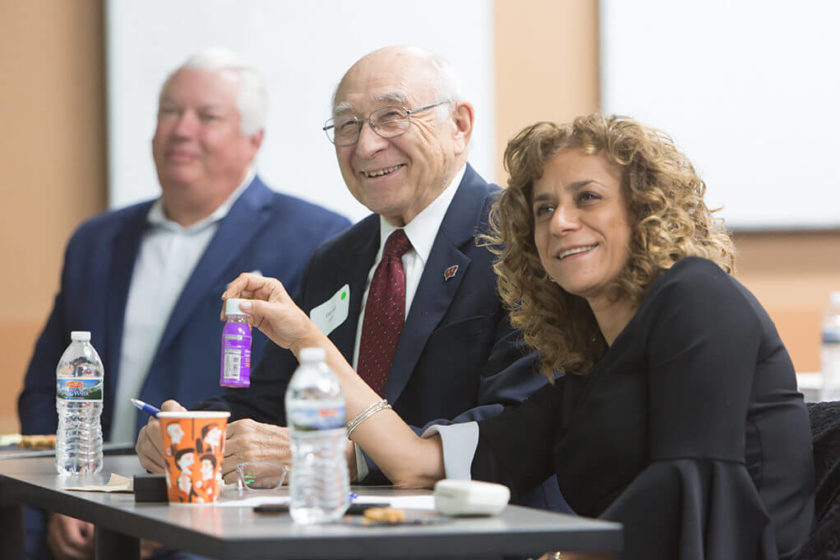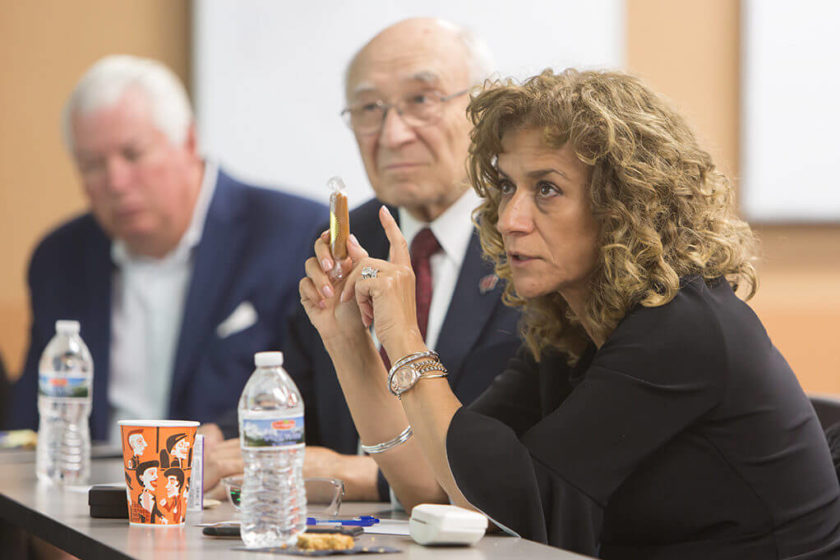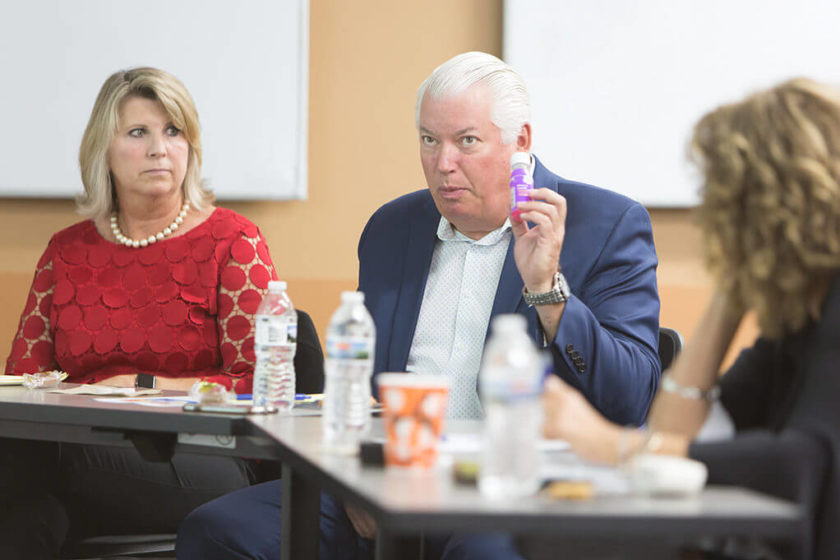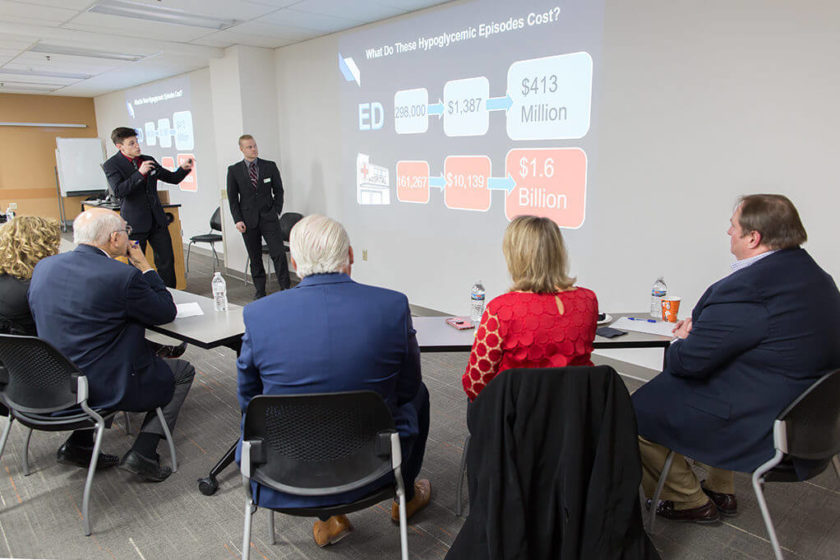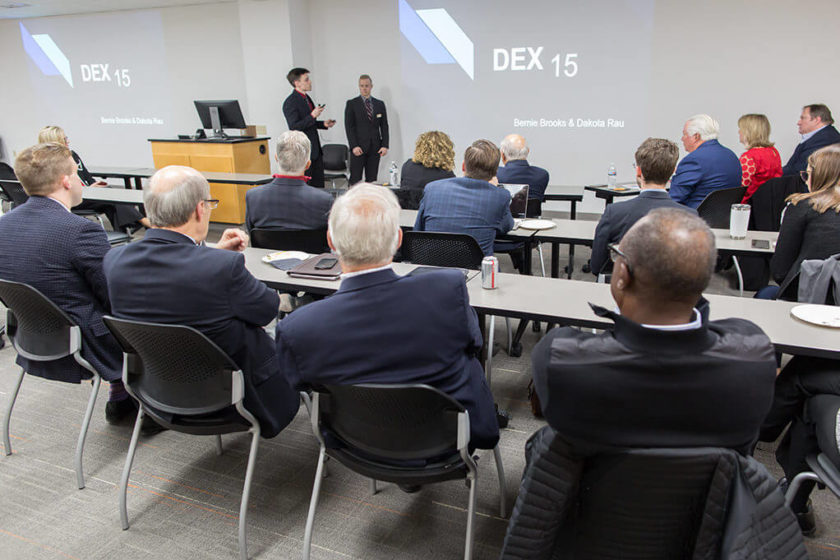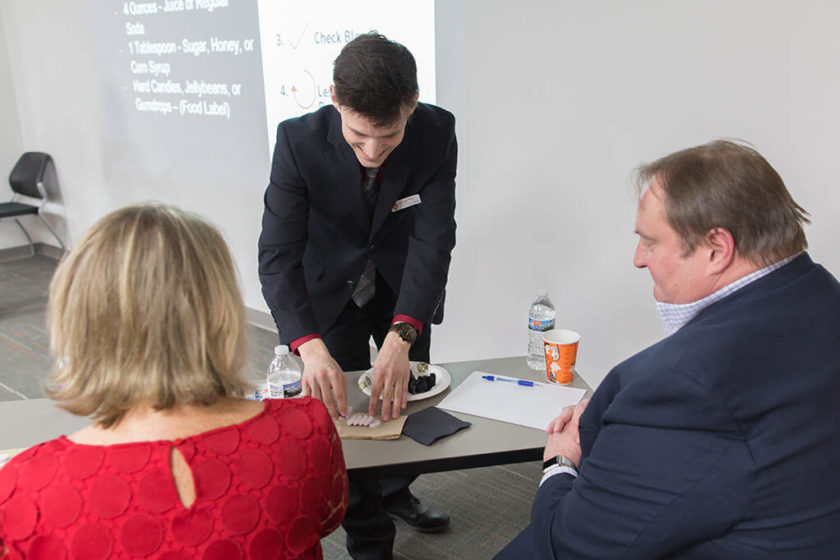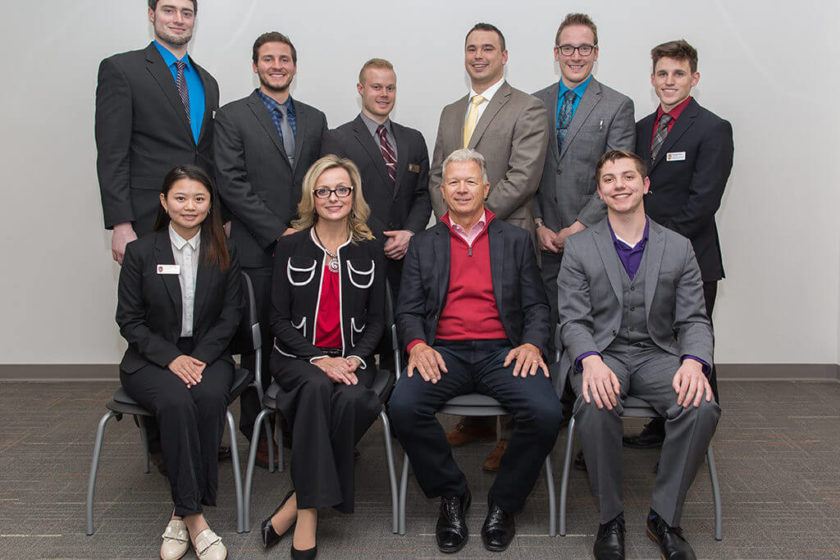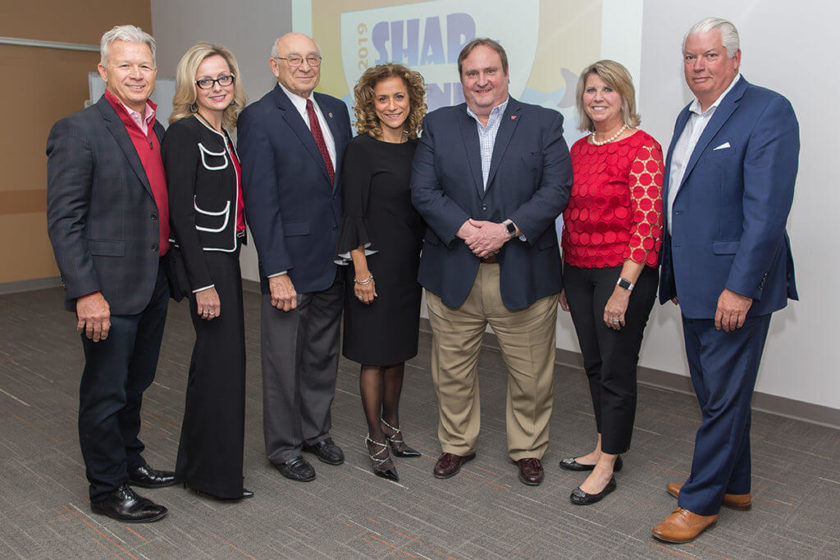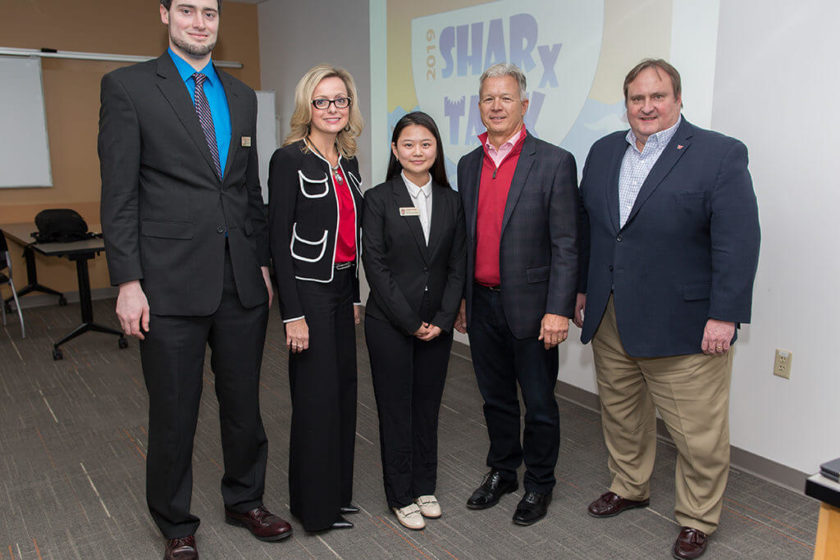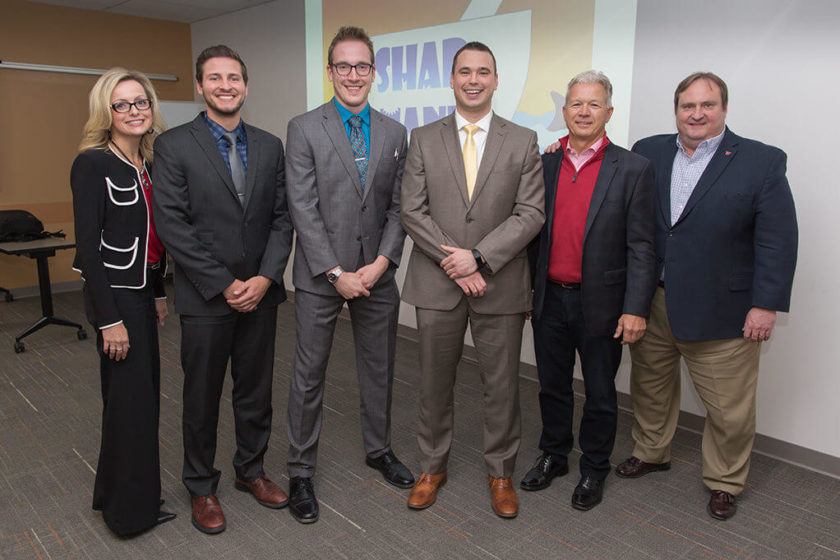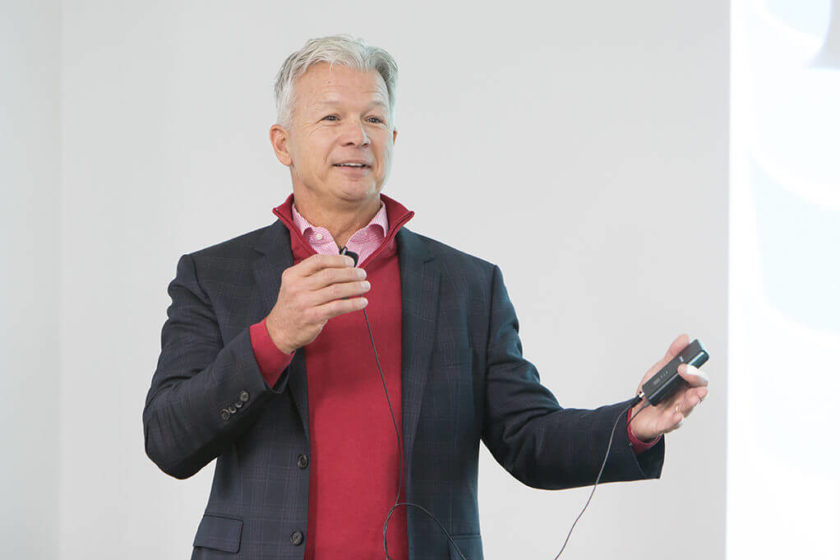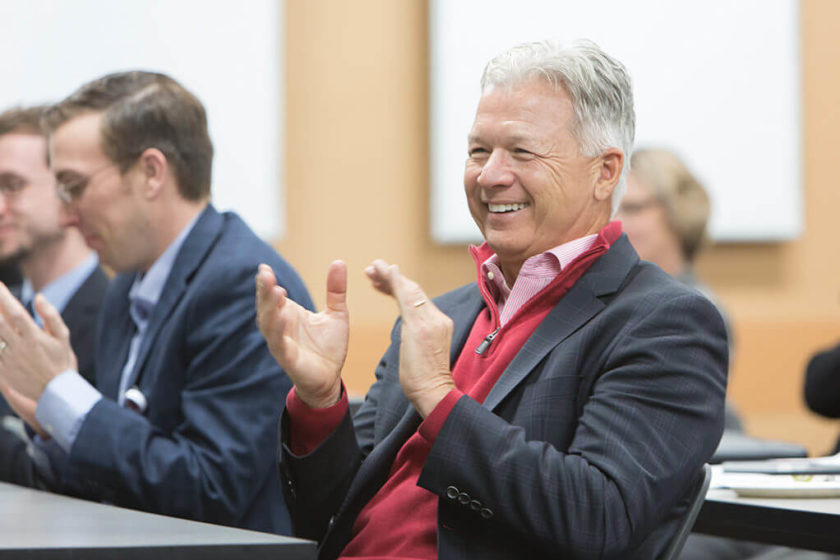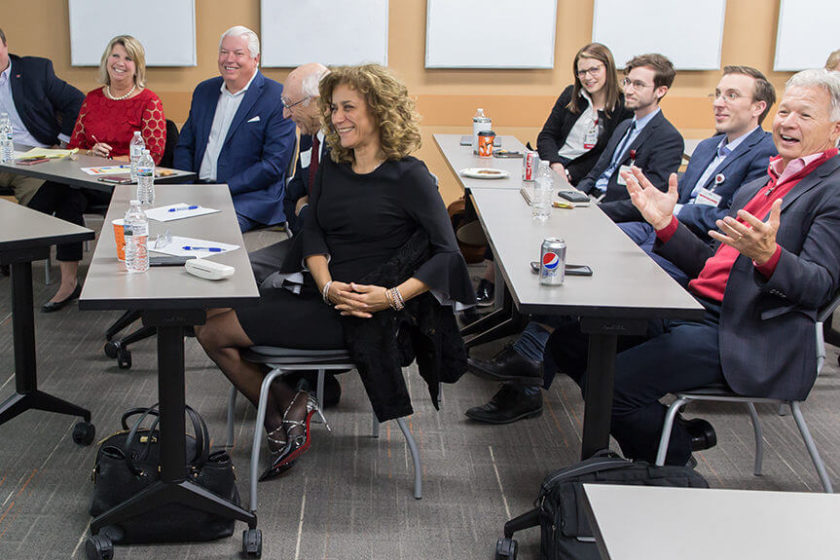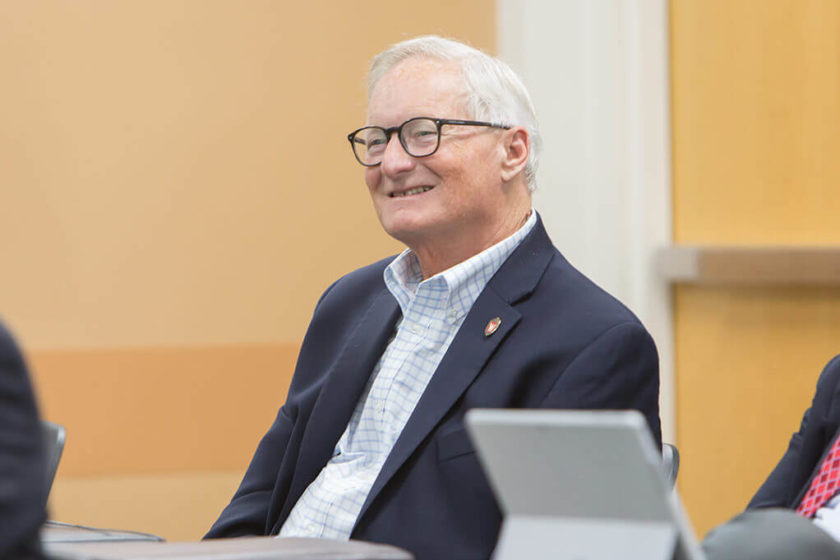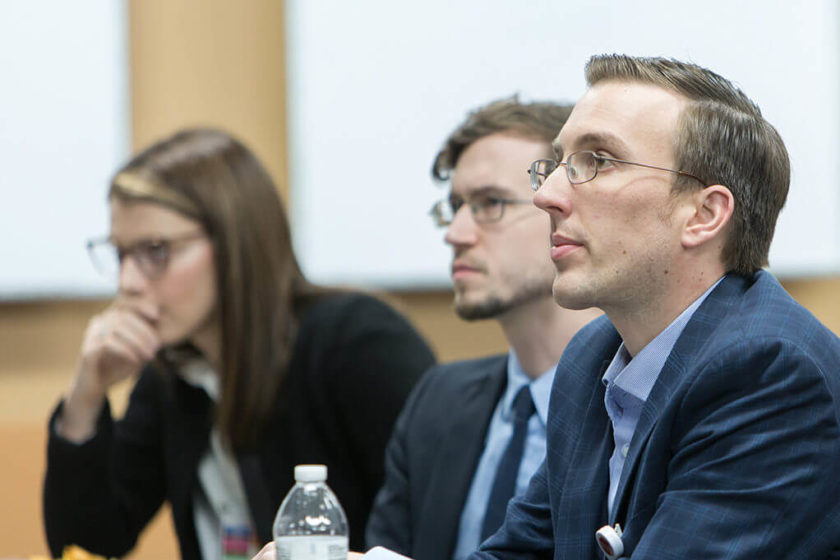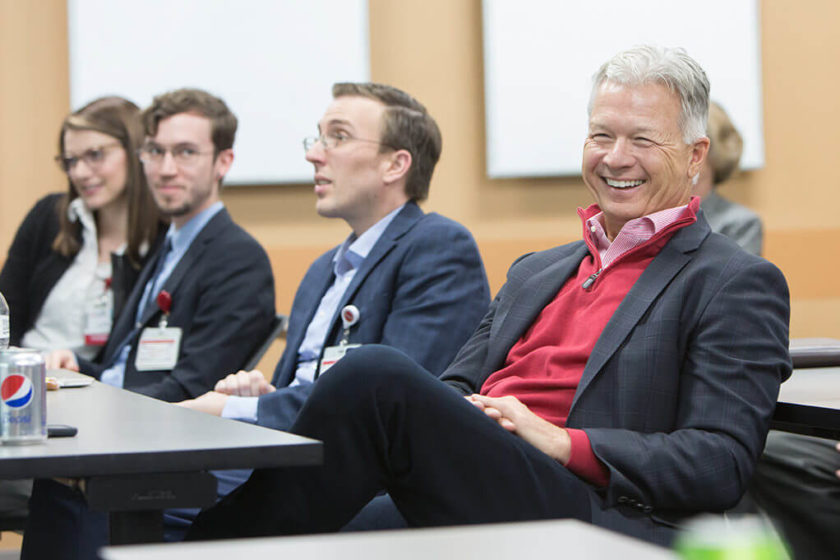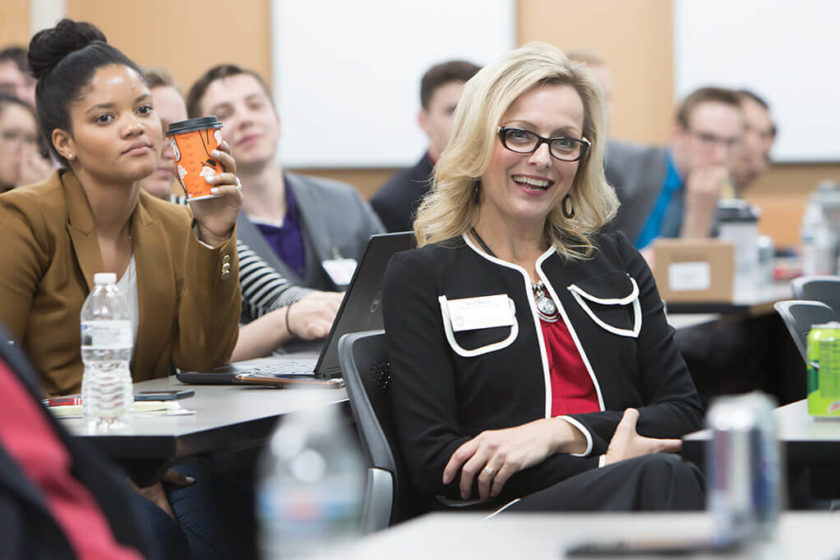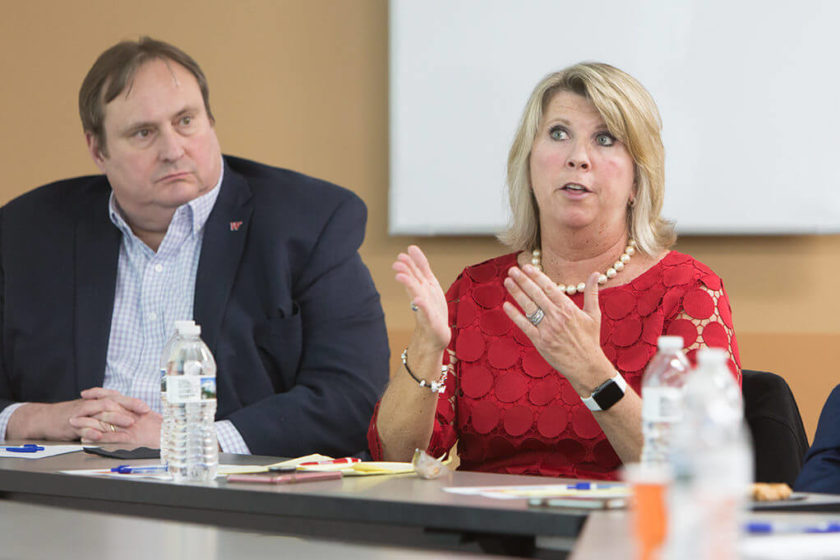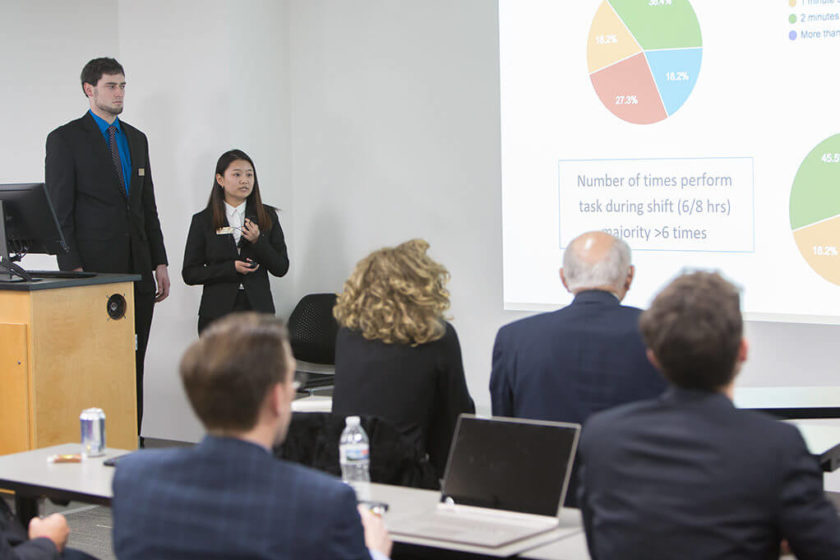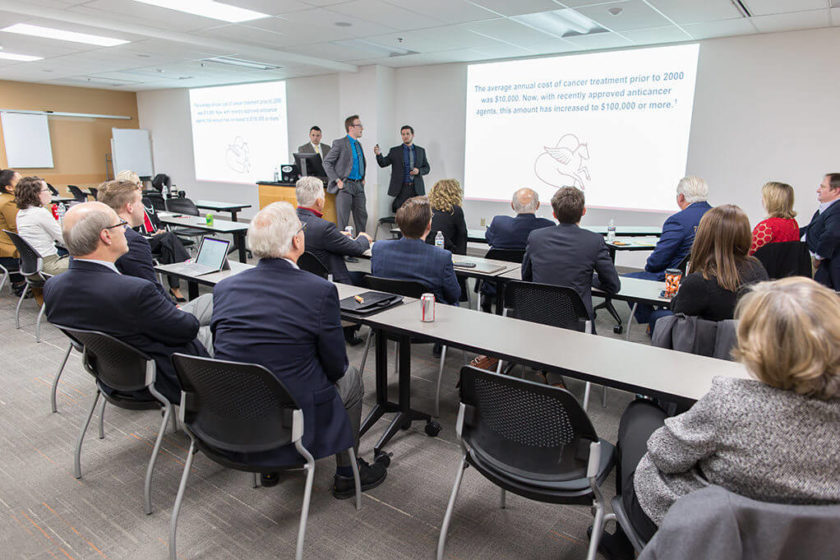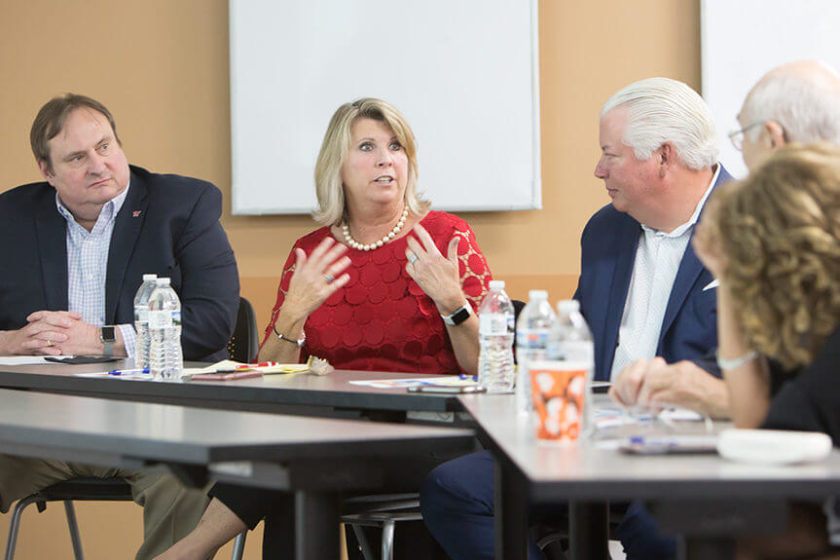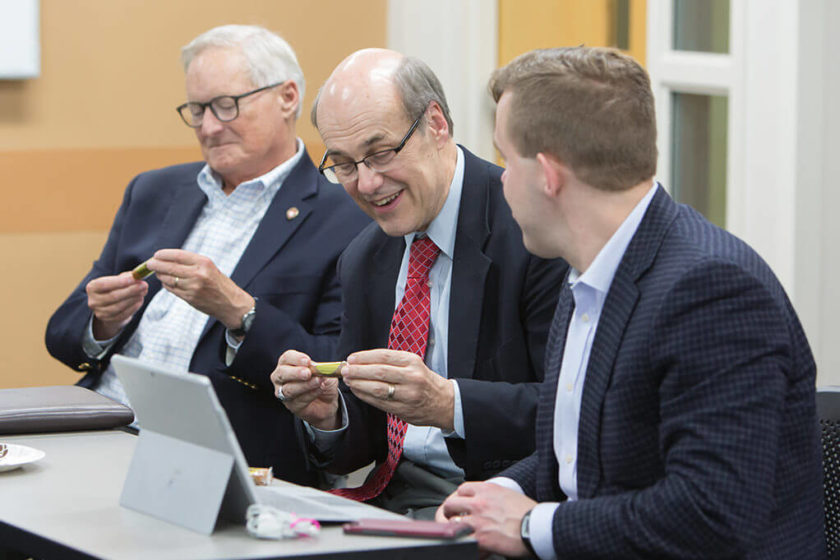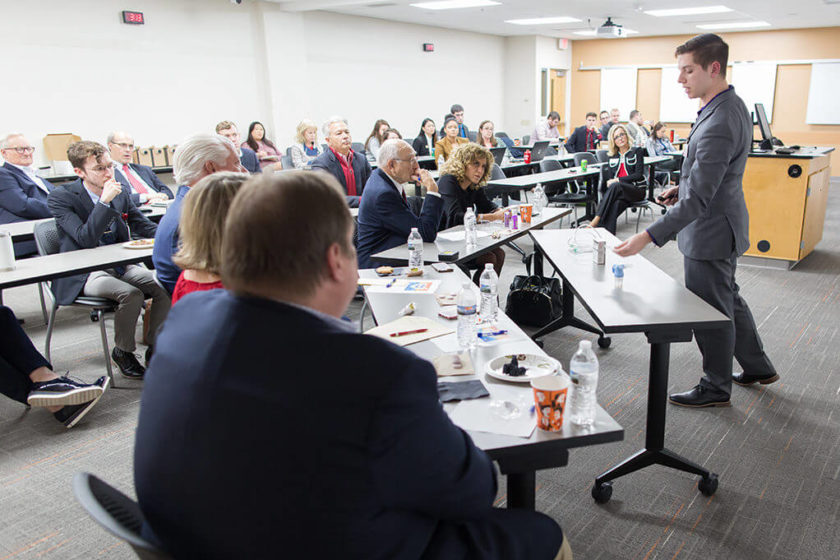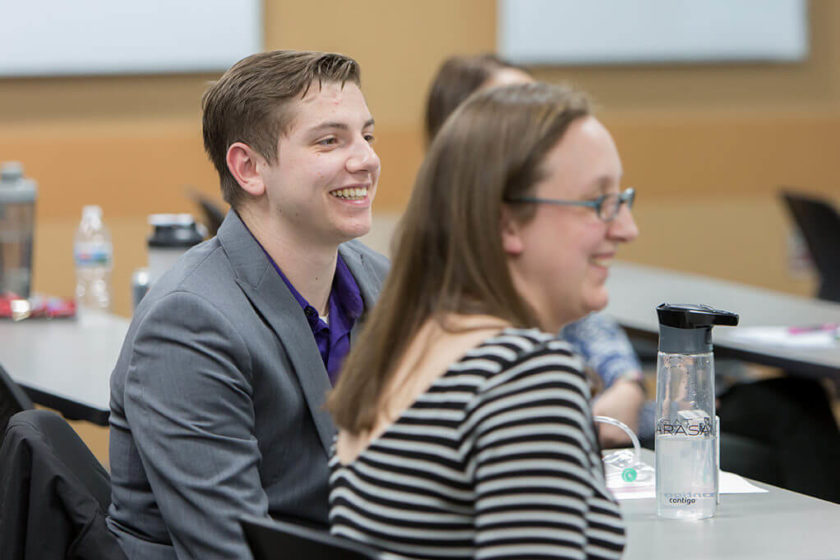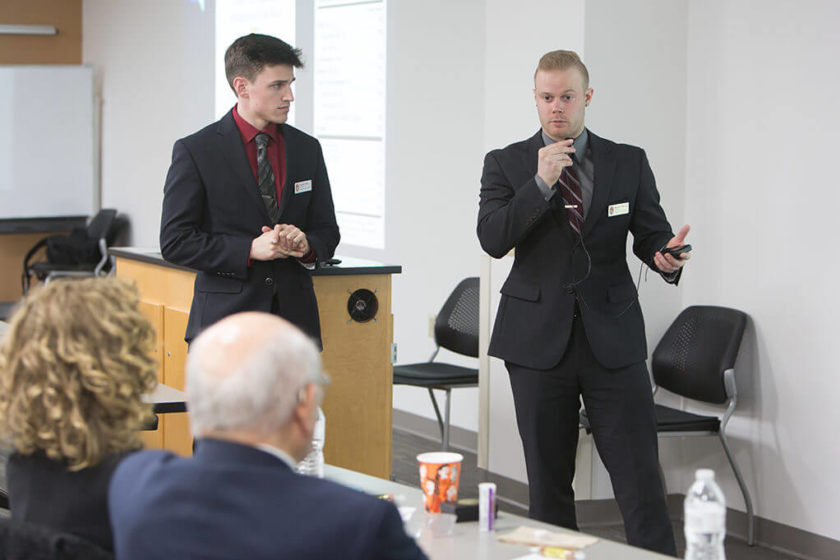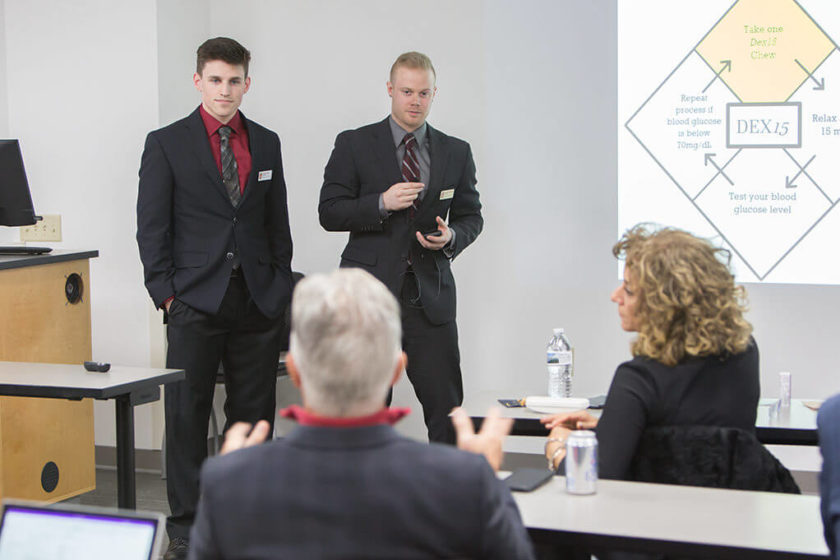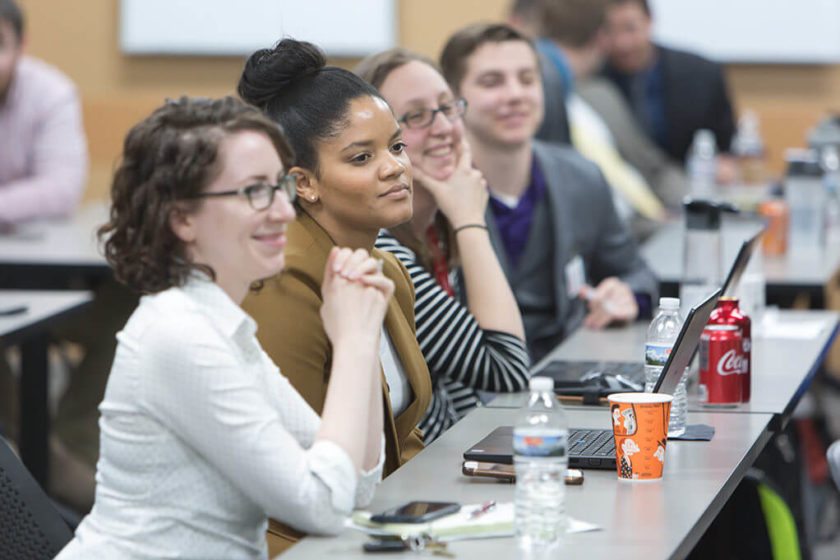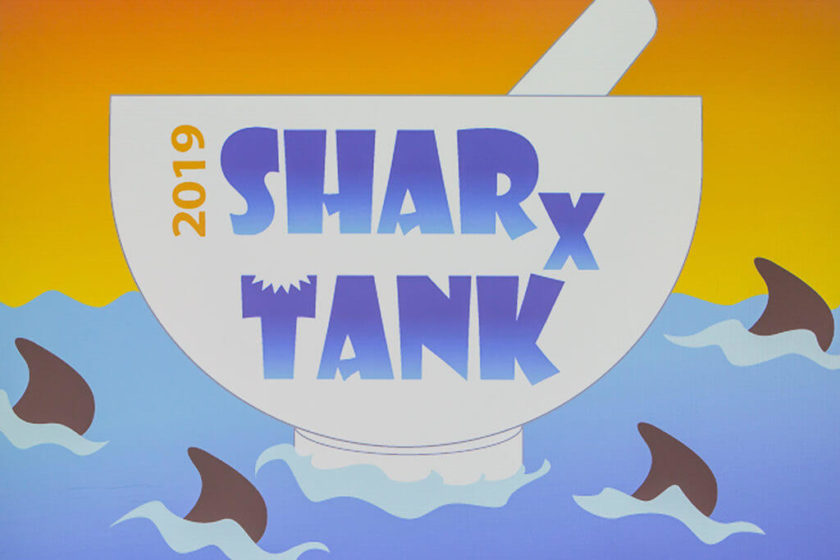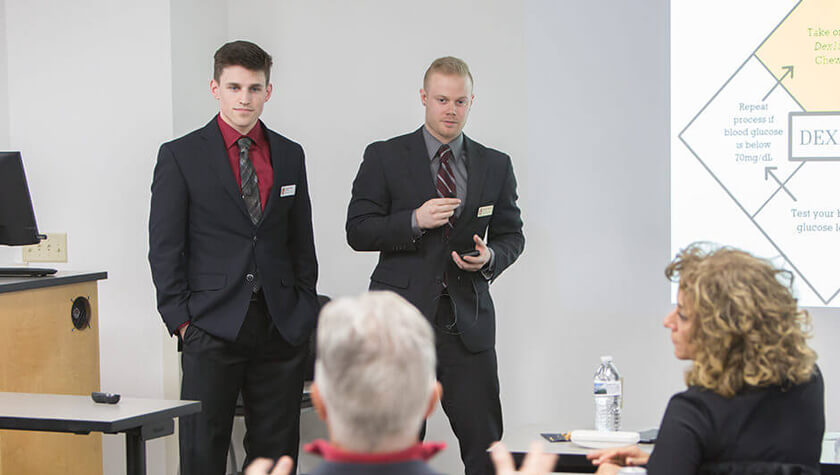
In front of expert alumni panel, student pharmacists pitch innovative ideas to meet unmet needs
By Hanzhu Tang
Photos by Todd Brown
As a pharmacy intern, Linda Zheng frequently encounters patients with outdated insurance information. Each time, she has to manually enter all of the details on the card, while the patient waits and watches. Sometimes, after entering the various numerical codes, a notification pops up: the information doesn’t match, but with no clue to where the discrepancy is. The process starts again.
She wondered, “What if we could automatically pull information from the cards for easy, error-free entry into the pharmacy records?”
Zheng, a student in the Doctor of Pharmacy program at the University of Wisconsin–Madison School of Pharmacy, teamed up with Nelson Milbach, another student pharmacist at the School, to develop an algorithm that could do just that.
This is just one of the creative and practical solutions developed by PharmD students for the School’s second-annual SHARx Tank competition, which is the culmination of a semester of hard work and consistent meetings with an entrepreneurial-minded student group, led by Beth Martin, professor in the School’s Pharmacy Practice Division, and alumnus George Zorich (BS ’78), CEO of ZEDPharma.
This year, the group comprised 10 ambitious student pharmacists, like Zheng and Milbach, who drew from their pharmacy experience to conceive and cultivate new products and services to improve patient care.
Identify unmet needs
SHARx Tank and the accompanying student group were launched last year by Zorich, Martin, and other faculty at the School, to provide a platform for PharmD students to learn how to flesh out and pitch their business ideas to improve pharmacy practice. And the stakes are high: First place wins $4,000, and second place $1,000, all donated by Zorich.
Through a series of five meetings throughout the spring semester with Martin and Zorich, students identified and evolved their ideas. By the end of the semester, the students had to be prepared to pitch their ideas to a panel featuring School of Pharmacy Dean Steve Swanson and alumni judges, or “sharks,” who each have an impressive track record of success in leadership: Azita Saleki-Gerhardt (BS ’88, MS ’91, PhD ’93), president of operations for AbbVie, one of the largest pharmaceutical companies; Dan Luce (BS ’81), national director of pharmacy affairs at Walgreens; Dave Zilz (BS ’62, MS ‘64), former director of pharmacy for UW Health; and Debra Fluno (BS ’87), regional director of pharmacy operations and support services for Cardinal Health.
“During our first session, many students came in with no ideas but with an interest in innovating. So we told them to stop and think of something they find frustrating when they’re working in the pharmacy,” says Martin, who is also assistant dean for Assessment, Teaching & Learning for the School. “We asked, ‘Is there something that you could create to overcome that frustration?’”
“We tailor what we can to support their interests, including inviting alumni with relevant experience to sit on the judges panel.”
– Beth Martin
With this guidance, students brainstormed, sharpened, and constantly revised their ideas throughout the meetings with Martin and Zorich. Between sessions, students would read chapters from Zorich’s book, Entrepreneurs in Pharmacy and Other Leaders, to learn more about innovation and how to bring an idea to fruition. Occasionally the meetings featured a guest expert, such as Tom Thielke (BS ’67, MS ’69), former director of pharmacy at UW Health, and Ed Elder, director of the School’s Zeeh Pharmaceutical Experiment Station.
“It’s a flexible program that will help students make the connections they need and enhance their expertise,” says Martin. “We tailor what we can to support their interests, including inviting alumni with relevant experience to sit on the judges panel.”
In the group’s first year, meetings focused on the foundations of entrepreneurial thought. This year, relying on the six returning students to help the newcomers like Zheng and Milbach get up to speed, they were able to take some larger steps forward.
“I learned a lot from the returning students and aspire to be like them,” says Zheng, a first-year PharmD student and first-year competitor. “They were there to support us, answer our questions, and give suggestions for us to improve.”
Even for experienced students, the competitive nature of SHARx Tank means it’s never easy. “Dr. Zorich and I challenge them each week, and we encourage them to challenge each other,” says Martin.
In the tank
At the end of the semester, the four student groups who dared to wade into the SHARx Tank presented a range of solutions to challenges pharmacists face.
“The students had very well-thought-out ideas and they did a fantastic job preparing for their presentations,” says Fluno. “I could tell that they had spent a significant amount of time researching their idea, gathering the data to flesh it out, and preparing their pitch — all on their own time.”
Third-year PharmD students Graham Edwardson, Dean Bowen, and Griffin Budde presented a mobile application for both patients and pharmacists to track cycles of oral cancer treatments, enabling patients to optimize the balance between their daily life and the treatments and make the most of their good days. This app, which they named “Pegasus,” records the date of the treatment and the timing and type of side effects, and also includes medication alarms, medication delivery tracking, and live consultations with pharmacists.
Through a simple interface, patients can use that information to schedule future treatments around important dates, such as family outings or birthday celebrations.
“We think that we have an awesome idea that meets an unmet need,” says Edwardson. In fact, this group came up with the idea before the entrepreneurial-focused student group even started meeting for the spring semester.
Edwardson was a first-time participant in the program, but this was his teammates’ second dip in the SHARx Tank. As second-year competitors, Bowen and Budde were equipped with a strong foundation from last year and were prepared to focus more on the nuances of their business idea and proposal.
“It is awesome to see most of the teams go further and deeper with their ideas and work out more details on their new business plans,” says Budde.
Third-year PharmD students Bernard Brooks and Dakota Rau also returned to the group for the second year, pitching a single-dose caramel to treat diabetic hypoglycemia, as did Kyle Wayner, a second-year PharmD student who won last year’s first place prize with a game to teach youth about the hazards of dextromethorphan abuse. This year, Wayner pitched a unit dose formulation of tiotropium for nebulization, which would cut down on inhaler waste during hospital stays and discharges.
“Every year the bar seems to be raised to a higher level as the School’s student pharmacists are becoming increasingly competent, confident, and sophisticated in their presentations,” says Zilz. “The high level of preparation and creativity exceeded my expectations.”
“Entrepreneurial skills are critical to developing successful strategies needed to create, market, sell, and deliver new products, programs, practice models, and services in today’s environment.”
–Dave Zilz
After each group presented and responded to the judges’ illuminating questions, the alumni panel deliberated and selected a winner: the Pegasus oncology app.
“We are extremely excited to continue pursuing our idea because we believe that our oral oncology management application can truly make a positive impact in the lives of countless patients,” says Budde. “Currently, there is not an application on the market that is designed like ours and it is our personal belief that oncology patients deserve to have every tool available to help them in their fight against cancer.”
“We know the ‘sharks’ believed in our idea,” says Edwardson. “That means a lot because they’re on the front lines of innovation in pharmacy.”
The imperative of entrepreneurship
Pharmacists are natural leaders and have historically been entrepreneurs and innovators. Helping pharmacy students develop those skills early will enable them to effect change in practice at the onset of their career, and more strategically.
“Entrepreneurial skills are critical to developing successful strategies needed to create, market, sell, and deliver new products, programs, practice models, and services in today’s environment,” says Zilz.
“Giving students that opportunity to learn entrepreneurial skills will give them insight and courage as they go out into the real world to not be afraid to think big, try out new ideas, and ultimately make a difference in the lives of the patients that we serve,” says Fluno. “The energy they brought to their presentations inspires me.”
Zheng agrees about the need to innovate, saying that the semester of meetings and work she put into her proposal have taught her just how important outside-the-box thinking is to pharmacy.
“The dynamism of the pharmacy profession mandates that we, as future pharmacists, must keep our minds open and continue to find ways to improve patient care,” she says.
The lessons delivered by faculty, guest presenters, alumni, and insight from fellow students have become deeply rooted in the students’ minds.
“The competition taught us about the necessary steps if you really want to change the practice of pharmaceutical care across the country with one of your ideas, such as spending countless hours perfecting your product or service, taking criticism and using it to pivot in the right direction, and leveraging the right people to aid you in the creation of your product or service,” says Budde.
This entrepreneurial student group and SHARx Tank competition has given students real-world experience completing each of those steps and has introduced them to myriad other innovators in the Badger pharmacy network.
“All the capabilities these students have right now will position them to be more effective as leaders in our society in future years,” says Zilz.
Learn how the School’s SHARx Tank was developed.
